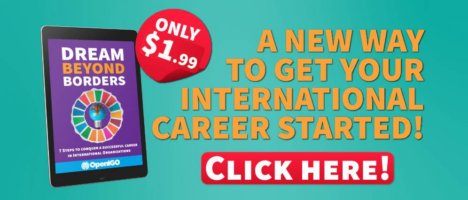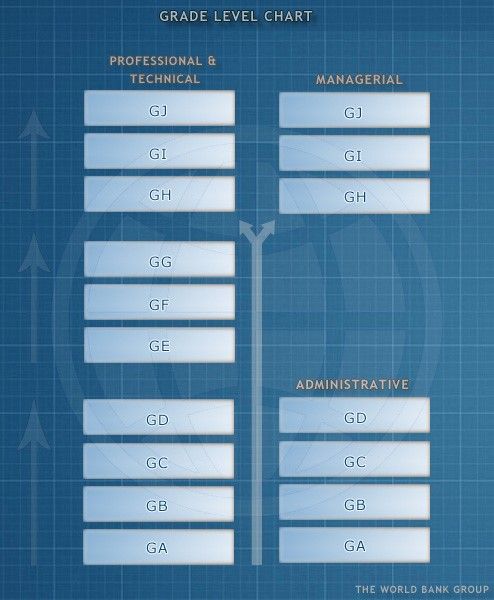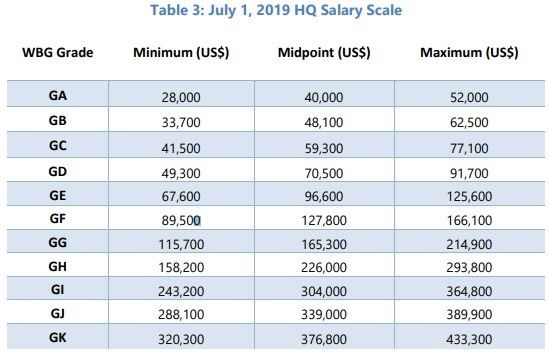In order to start a career with the World Bank Group, applicants must know what are the existing recruiting initiatives, their eligibility criteria and different stages of the selection processes, as well as have a broad understanding of the culture and values of this complex international organization.
a) The World Bank Internship Program
For those interested in starting or expanding their international careers while studying for a Master`s program or Doctorate, this program is a great option. The aim of the World Bank Internship Program is to train and provide experience to young graduate students. Besides, it is a good way of learning about the World Bank’s complex structure and work!
The WB Internship Program selects candidates for operational areas (economics, finance, public health, education, and social sciences, among others) and corporate support (accounting, communications, human resources, information technology, treasury, and other corporate services). There are two selection periods for this program:
- Summer Internship (May – September): with applications between December 1 and January 31;
- Winter Internship (November – March): with applications between October 1 and 31.
To be eligible for the program, you must:
- Be enrolled in a Master’s or Doctorate program, with plans of returning to this graduate program following completion of the internship;
- Be proficient in English. Knowledge of another World Bank official language is an advantage;
- Be a national of a Member State.
Applications to this program must be submitted online, through the organization’s website. You must fill out an online application form, as well as upload your CV, Statement of Interest, and proof of enrollment in a Master’s or Doctorate program.
To help you prepare for this competitive selection process, OpenIGO has developed a special eBook for candidates, “The World Bank Internships – The complete guide”, which details all the selection stages. In addition, preparatory services, such as a review of application documents and a mock interview are offered at our online store. Access:
World Bank Internships – Products & Services
b) IFC Summer Internship Program
This is the perfect opportunity for students in their first or second-to-last year of an MBA or similar program. Applications are usually open from December to mid-January. The IFC receives approximately 1500 applications each year, from which 30 to 40 candidates are selected. Successful candidates may work at the IFC headquarters in Washington D.C., or at one of its national or regional offices.
Business development, investment proposal reviews, financial modeling and analysis, portfolio management, and consultancy services are some of the assignments interns might take on during the program.
To apply for the program, candidates must meet the following requirements:
- Strong interest in and commitment to impact investing and sustainable private sector solutions;
- Work experience (3-6 years) in finance, which could include investment banking, project finance, corporate finance, consulting, private equity, credit analysis, commercial banking, and/or portfolio management;
- Knowledge of sectors relevant to IFC and emerging markets experience preferred;
- Strong analytical, quantitative, communication and negotiation skills;
- Business development and client relationship skills;
- Enthusiasm for working in multicultural teams and across borders;
- Excellent verbal and written communication skills in English; proficiency in one or more other languages including Arabic, Chinese, French, Portuguese, Russian and Spanish strongly preferred.
The IFC internship is a remunerated program, and takes place between May and September, lasting a minimum of four months.
Discover our WB Internships Products & Services
c) ICSID Internship
The International Centre for Settlement of Investment Disputes (ICSID) is a World Bank agency dedicated to resolving conflicts related to international investments in member countries. This is the ideal WBG body for anyone who has an academic and professional profile in the legal field. The aim of this internship program is to contribute towards the professional development of students who show an interest in international investment dispute settlement and international investment law.
Internships last for a minimum period of 12 weeks, and interns must work for a minimum of 10 (ten) hours per week. Interns are assigned to work at the ICSID headquarters in Washington, D.C.
The minimum requirements to apply to this program are:
- Be enrolled in a graduate program;
- Be able to provide written confirmation stating that you will either: (i) obtain academic credit for at least one term/semester in a course of study; or (ii) will be provided with a stipend by your university for the duration of the internship;
- Have or be able to obtain an F1 or G4 visa, or be a U.S. citizen or resident (Green Card holders), and
- Be able to cover the costs of travel, accommodation, and living expenses in Washington, D.C.
- Satisfy the requirements of your university for an internship
Additionally, candidates must meet other requirements such as:
- A demonstrated interest and knowledge of investor-State dispute settlement and international investment law;
- Rising 3L, LLM or Ph.D. student;
- Fluency in English and preferably in at least one of the other two official languages of ICSID (i.e., French and Spanish);
- Ability to conduct research on a range of issues in the fields of arbitration and investment law;
- Strong writing and legal drafting skills.
The internships take place annually in three different periods:
- January-April;
- May-August, and
- September-December.
To apply, you must complete the form available on the ICSID website, attaching a CV and proof of enrollment in a graduation course (Master’s or doctorate). Documents should then be sent to the following e-mail: icsidinternship@worldbank.org.
Here are the usual application deadlines:
- June 15 for the September-December Internship period (fall semester);
- November 15 for the January-April Internship period (spring semester); and
- January 15 for the May-August Internship period (summer semester).
Discover our WB Internships Products & Services
d) The World Bank Group YPP
If you have a strong desire to work in the area of international development and hold a Master’s or doctorate qualification, as well as relevant professional experience in a co-related field, the WBG YPP might be the ideal program for you. The WBG YPP is a program designed to select highly qualified young professionals who have technical knowledge, relevant work experience, and leadership skills, from different cultural backgrounds.
This is considered the WBG’s most prestigious program, with those selected allocated to work in the organization’s operational areas. The minimum requirements to take part in this program are:
- Be born on or after October 1, 1992;
- Fluency in English;
- Have a Master’s or doctoral degree and specialize in a field relevant to YPP Business Areas*;
- Although nationals from any country can apply, preference is given to those of WBG member states or countries of operations.
*There are specific requirements to be observed by those who wish to apply for a position with the WB, IFC or MIGA in relation to educational level and work experience:
For candidates interested in the WB placement, these requirements are:
- Complete a relevant master’s degree by June 30 of the selection year or PhD before September of the upcoming year;
- Demonstrate 3+ years of relevant experience, or the equivalent in continued study at the doctoral level.
For those interested in the IFC or MIGA placement, these requirements are:
- Complete a relevant graduate degree (e.g. Master’s in Business Administration, Economics, International Relations, Science, and Engineering) before September of the upcoming year;
- Demonstrate 4+ years of relevant experience in finance, political risk insurance and credit enhancement, project/program development, economic development and/or consulting. Certifications such as the CFA are a plus.
The majority of candidates usually exceed the minimum eligibility requirements. Therefore, it is important to observe that additional qualifications are also desirable in order to excel in this selection process, such as:
- Display a commitment and passion for international development;
- Possess outstanding academic credentials;
- Exhibit excellent client engagement and team leadership skills;
- Work experience in emerging markets or developing countries;
- Full proficiency in one of the following official WBG languages: Arabic, Chinese, French, Portuguese, Russian, and Spanish.
Applications to this program must be submitted online, through the organization’s website. You must fill out an online application form, as well as upload the following documents:
- Curriculum Vitae;
- Course certificates;
- Abstract of dissertation/thesis;
- 2 application essays.
In order to help you prepare for this competitive program, OpenIGO has developed a special eBook, “The World Bank Group Young Professionals Program – The essential guide”, which aims to prepare candidates for all the stages of the selection process. Special services, such as application reviews and mock interviews, are also available. Access:
World Bank YPP – Products & Services
e) The World Bank Group Analyst Program
Another important World Bank Group recruitment initiative is its Analyst Program, which selects young professionals to work for two years in a specific practice, region, or corporate unit in the World Bank Group. The activities you can carry out as an analyst include management and data analysis, research, project management, communications, finance, among others.
To apply for this program, you must meet the following requirements:
- Citizenship of a World Bank Group member country;
- Passion to contribute to the World Bank Group mission to end extreme poverty and boost shared prosperity;
- Maximum age of 28 (i.e., born on or after January 1st, 1989);
- Master’s or Bachelor’s degree in a relevant field;
- One to three years of relevant work experience in one or more specialty areas;
- Analytical thinking, proven academic success, strong written and oral communication skills, and leadership potential;
- Experience working or studying in developing countries is preferred;
- Fluency in English is required. Fluency or proficiency in other languages, particularly Arabic, Chinese, French, Portuguese, Spanish, or Russian, is preferred.
Please be aware that applications for this program open according to demand. In other words, this program is not available every year.
Discover our WB Jobs Products & Services
f) WBG Consultant
The WGB does not have a proper “consultancy program” but this type of work is very relevant to the Bank’s operations. Consultancy vacancies are offered due to an organization’s need to fill specific positions in some of its projects or areas.
Consultancy is an excellent way of starting a working relationship with the WBG! It is true that the contract is to work for a defined period but it will enable you to network and maintain long-term contact with the Bank. Consultancy contracts may be short-term (maximum of 150 days) or extended, lasting for one year, and may be renewed for a further 12 months.
Firstly, to be a World Bank consultant, you must be a specialist in one of its job families, with some additional knowledge of one of the regions of the world. Among the activities carried out by consultants are: writing reports and technical opinions; assisting with project planning and development; conducting research, and working as a work team advisor.
Those interested in this type of vacancy should search the organization’s job site. To find the vacancy that best fits your profile, use the job family, location and organization filters. The minimum requirements for consultants vary from vacancy to vacancy but, generally speaking, they require university qualifications, fluency in English and experience in the working area.
With regards to the documents required, prepare your Resume or Curriculum Vitae and a Cover Letter, presenting your qualifications and why you are interested in working for the World Bank Group. As a consultant, you will not be part of the World Bank’s permanent staff, but will have the right to organizational identification (ID), a salary payment and access to some of the benefits, according to the type of contract signed. Consultants cannot lead teams or projects within the Bank.
Discover our WB Jobs Products & Services






